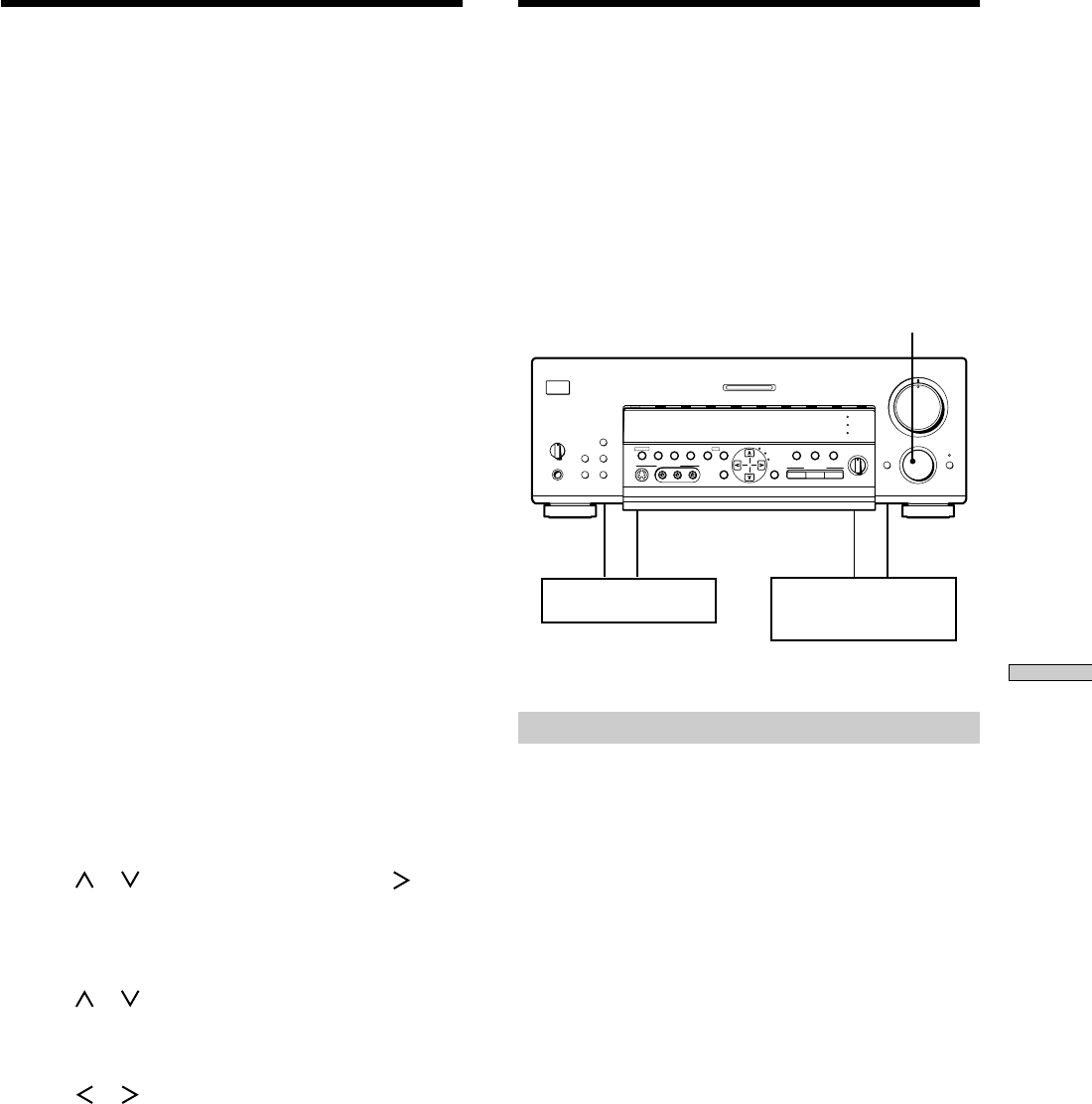
45
GB
Other Operations
Indexing Preset Stations
and Program Sources
You can enter a name of up to 8 characters for preset
stations (station index) and program sources. These index
names (for example, “VHS”) appear in the receiver’s
display when a station or program source is selected.
Note that no more than one name can be entered for each
preset station or program source.
This function is useful for distinguishing components of
the same kind. For example, two VCRs can be specified
as “VHS” and “8MM,” respectively. It is also handy for
identifying components connected to jacks meant for
another type of component, for example, a second CD
player connected to the MD/DAT jacks.
1 To index a preset station
Rotate FUNCTION to select the tuner.
The last station you received is tuned in.
To index a program source
Select the program source (component) to be
named, then go to Step 3.
2 Tune in the preset station you want to create an
index name for.
If you are not familiar with how to tune in preset
stations, see “Tuning to preset stations” on page 40.
3 Press CURSOR MODE repeatedly until the INDEX
indicator lights up.
4 Create an index name by using the cursor buttons
as follows:
Press
or to select a character, then press to
move the cursor to the next position.
The index name is stored automatically.
To insert a space
Press
or until a blank space appears in the
display (the space character is between “11” and “A”).
If you’ve made a mistake
Press
or repeatedly until the character to be
changed flashes, then select the right character.
To assign index names to other stations
Repeat Steps 2 to 4.
Playback component
(program source)
c
ç
ç
c
Recording component
(tape deck, MD deck,
VCR)
Your receiver makes it easy to record to and from the
components connected to it. You don’t have to connect
the playback and recording components directly to each
other: once you select a program source on the receiver,
you can record and edit as you normally would using the
controls on each component.
Before you begin, make sure you’ve connected all
components properly.
ç: Audio signal flow
c: Video signal flow
Recording on an audio tape or MiniDisc
You can record on a cassette tape or MiniDisc using the
receiver. See the instruction manual of your cassette deck
or MD deck if you need help.
1 Select the component to be recorded.
2 Prepare the component for playing.
For example, insert a CD into the CD player.
3 Insert a blank tape or MD into the recording deck
and adjust the recording level, if necessary.
4 Start recording on the recording deck, then start
playback on the playback component.
Notes
• You cannot record the audio signals from a component
connected to the 5.1 INPUT jacks.
• You cannot record a digital audio signal using a component
connected to the analog TAPE REC OUT or MD/DAT REC
OUT jacks. To record a digital audio signal, connect a digital
component to the DIGITAL MD/DAT OUT jacks.
• Sound adjustments do not affect the signal output from the
TAPE REC OUT or MD/DAT REC OUT jacks.
Recording
MODE MUTING
5
0
1
3
9
7
46
2
8
10
•
•
•
•
•
•
•
•
•
•
•
•
•
•
•
•
•
•
•
•
•
•
•
•
•
•
•
•
•
•
PHONES
SPEAKERS
A
OFF
A
+B
B
MASTER VOLUME
FUNCTION
SHIFT FM/AM
– +
DISPLAY
PRESET TUNING
VIDEO 3 INPUT
•
•
•
g
RLVIDEOS-VIDEO AUDIO
VIDEO 1
MEMORY FM MODE
EQ
ON/OFF
5.1
INPUT
INPUT
MODE
PTY EON– RDS –
CURSOR
MODE
SET UP
SOUND FIELD
GENRE MODE ON/OFF
BALANCE
LR
SOUND FIELD
BASS BOOST
EQ
SURROUND
EQUALIZER
INDEX
VIDEO 2 VIDEO 3 DVD TV/LD TAPE MD/DAT CD TUNER PHONO
MULTI CHANNEL DECODING
TUNING/
– PTY SELECT
+
FUNCTION
